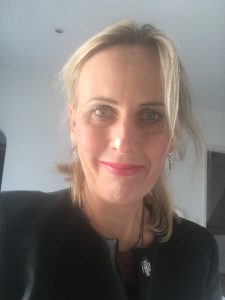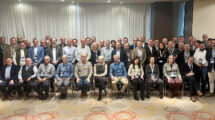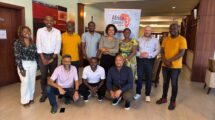The location was chosen upon invitation from Walter van Dijk, who was one of the founders of the Special Interest Group on Management of Service Portfolios (SIG-MSP, former TF-MSP), chair and Steering Committee Member of the group, who has recently changed his career to serve as Alderman of Zeist. Walter welcomed us to the meeting, reminding of the foundation and history of the group and Martin Bech, current chairman, shared pictures from the first meetings where we saw familiar faces, a little younger.
First part of the meeting focused on Services for Campuses. Maurice van den Aker started with a presentation on Development of a Campus ICT infrastructure Service Portfolio. Except for developing “campus” services (like Network as a Service, SURFwired, SURFwireless and SURFfirewall for example), SURF’s focus is also on integrating processes for the individual services in such a way that the institute experiences only one point of contact. As it is work-in-progress, part of the session included a lively discussion and exchange of ideas and experiences among the NRENs representatives.
Lightning talks session entitled “What we have learned from failures” attracted a lot of interest. Michel Wets from SURF, Mark Tysom from JISC and Harri Kuusisto presented examples, and in each case, making a direct connection to lessons learnt from each of those. Most importantly how the learning points from this are shaping current and future service developments and uptake. Open and honest sharings proved how much trust there is among MSPiers in the name of future improvements and learning from one another. The group concluded that there is never innovation without risks and failures are necessary to progress.
The afternoon session focused on a popular topic of Digital Strategies. Tomi Dolenc from ARNES talked about supporting digital education in context of Task Force on Educational Services and Activities (TF-EDU), that has been created with aim of identifying common goals and challenges in order to create a global vision and strategy. Discussion followed on how to proceed with TF-EDU and raise awareness among NRENs to create further opportunities for collaboration. Tomi also shared how ARNES has been catering for educational institutions.
Furthermore, Harri Kuusisto talked about Finish Digivisio 2030, a joint programme whose aim is to create a future for learning that benefits higher education institutions and learners.
Jan Meijer from Sikt presented Norwegian R&E digital transformation strategy and transforming the landscape to deal with transformation.
Martin Bech from DeiC concluded the meeting with a presentation on crisis response activities, such as analysis of resilience regarding brownouts, dependence on sea cables, detecting and reacting to sabotages on our fibre footprint and possible other types of crisis response activities.
After the meeting, the group was invited for a sightseeing tour of the city and a nice Mediterranean dinner afterwards, during which vivid discussions continued.
SIG-MSP will meet again in October. To learn more about the group’s activities and stay updated about future events, visit the dedicated wiki page and subscribe to the mailing list.







